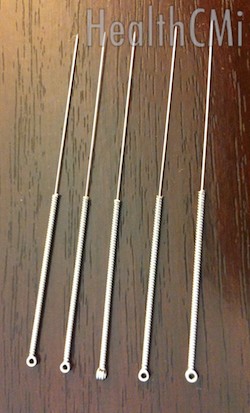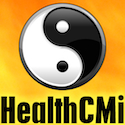Researchers from the Department of Anesthesiology at the Affiliated Hospital of Nanjing have discovered that acupuncture prevents dangerous side effects caused by an important anti-nausea drug. Droperidol is a potent antiemetic and antipsychotic medication. This medication runs the risk of causing QTc prolongation, a heart rhythm disorder. The investigative team found that the application of electroacupuncture at acupuncture point PC6 successfully prevented QTc interval prolongation caused by the use of droperidol. 
The researchers concur with the Traditional Chinese Medicine (TCM) tenet that PC6 regulates the heart beat and reduces arrhythmias. The laboratory experiment demonstrated a repeatable phenomena wherein electroacupuncture at PC6 prevented QTc interval prolongation due to droperidol injection. The researchers successfully measured pathways by which PC6 acupuncture exerts its protective action on the heart. The researchers note that Cx43 mRNA and protein significantly “increased in ventricular muscle” in the electroacupuncture group but not in the medication only or control group.
Droperidol is used for the treatment of postoperative and chemotherapy related nausea and vomiting but may cause heart dysfunction. Researchers speculate that the cardioprotective mechanisms of electroacupuncture at PC6 and its success in preventing droperidol side effects may be due, in part, to acupuncture’s ability to regulate the balance of sympathetic and parasympathetic tone. In the experiment, PC6 was administered as a pretreatment prior to the injection of droperidol. The researchers added, “Pretreatment of P6 EA (PC6 electroacupuncture) significantly reduced QTc prolongation induced by droperidol, and this property may be related to the up-regulation of Cx43 mRNA and protein, which may contribute to the transmural heterogeneity of repolarization and abbreviate the prolonged QT intervals in droperidol treated hearts.” This experiment demonstrates that acupuncture is an effective non-pharmaceutical approach to avoiding adverse events caused by medication therapy.
In related research, acupuncture reduces chemotherapy side effects for colorectal cancer patients. Blood samples demonstrate that acupuncture enhances the immune system’s NK (natural killer) cells for colorectal cancer patients. Subjective testing showed improved mental health scores. The researchers concluded that acupuncture is both “feasible and safe for CRC (colorectal cancer) patients….”
The research team commented that NK cells are “a first line of defence against the metastatic spread of tumour cells.” The study shows that acupuncture benefits NK cell numbers. The acupuncture points were: LV3, ST36, SP9, GB39, LI4, PC5, TB5, LU7. Moxibustion was applied to SI6, TB5, ST32 and CV6 for two minutes at each acupuncture point. Acupuncture was applied twice a week starting one week prior to chemotherapy for a total of six acupuncture treatments.

The study designed used randomization and control groups to ensure accuracy. The researchers discovered that acupuncture reduced both anxiety and depression and exerted “positive trends on the levels of WBC, ANC, B and NK cells….” In addition, “The increase on WBC and ANC resulted in approximately a 1.5x reduction in leukopenia and neutropenia rates. The acupuncture group showed a twofold increase in NK cells rate compared to the control group.” The team notes that acupuncture may “stimulate anticancer immunity” and “promote a myeliprotective effect.”
References:
Zhao, Feng, Suyang Cui, and Libing Huang. "P6 electro-acupuncture improved QTc interval prolongation by upregulation of connexin 43 in droperidol treated rats."
Pais, Irene, Nuno Correia, Isabel Pimentel, Maria José Teles, Esmeralda Neves, Júlia Vasconcelos, Judite Guimarães4 Nancy Azevedo et al. "EFFECTS OF ACUPUNCTURE IN LEUKOPENIA, NEUTROPENIA, NK AND B CELLS IN CANCER PATIENTS UNDERGOING CHEMOTHERAPY: A RANDOMIZED PILOT STUDY."


